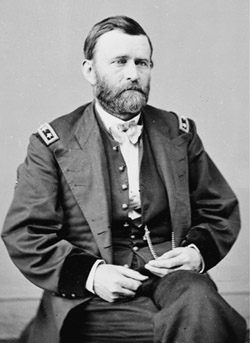

Library of Congress photo (LC-DIG-cwpbh-00939)
Born in Point Pleasant, Ohio, on April 27th, in 1822, the future
President was
baptized Hiram Ulysses Grant. Grant, however,
apparently did not like the name Hiram, and thus
used his middle
name - Ulysses. The congressman appointing Grant to West
Point, not knowing
this, by mistake listed Grant's name as
Ulysses Simpson Grant (Simpson being his mother's maiden
name).
Upon graduation (21 in a class of 39), in 1843, Grant was brevet
as a second lieutenant
in the Fourth Infantry. He was promoted
to second lieutenant in September, 1845. With the Fourth, he
was
part of the military occupation of Texas in 1845 and 1846.
In 1846, during the war with Mexico, Grant
participated in the
battles of Palo Alto, Resaca de la Palma, Monterrey, and the
siege of Vera
Cruz. In 1847, he participated in the battles of
Cerro Gordo, Churubusco, Molino del Rey, the storming
of
Chapultepec, and the assault and capture of the City of Mexico.
Grant was brevet first lieutent in
September, 1847, for gallant and
meritorious conduct in the battle of Molino del Rey and was
brevet
captain, also in September of 1847, for gallant conduct at
Chapultepec. He was promoted to first
lieutenant in September
of 1847. He was promoted to captain, Fourth Infantry, in August
of 1853.
He resigned his commission in July of 1854.
Unsuccessful as a farmer, in 1858 Grant moved his wife (Julia B. Dent - sister of his
West Point roommate) and
four childern (Fredrick Dent Grant, Ulysses Simpson Grant, Ellen Wrenshall Grant,
and Jesse Root Grant) to
Galena, Illinois, where Grant's two brothers ran a leather shop.
In April 1861, Grant received but declined an appointment as the commander of a company
of Illinois volunteers.
In June of 1861, following several failed attempts to reenter Federal service,
Illinois Governor Richard Yates
appointed Grant Colonel of the 21st Illinois Regiment (volunteers).
In August of 1861, Grant received a
promotion to Brigadier General (of volunteers). (This promotion
was back-dated to May). During 1861 Grant was
engaged in the seizure of Paducah, Kentucky (September)
and the expedition to Belmont Missouri (November).
In February of 1862, forces under Grant took Fort
Henry and later, after a brief siege, took Fort Donelson. As a
result of these victories Grant was
promoted to Major General. In April of 1862, the Battle of Shiloh took place.
Supprised by Confederate
forces under General Albert Sidney Johnston on April 6th, Union forces ultimately
managed to hold their
positions. The key position, a sunken road that provided defenders some protection,
became known as
the "Hornet's Nest". During one assault against the "Hornet's Nest", General Johnston was
killed.
Reinforced by elements of General Buell's army, Union forces successfully counter-attacked on April 7th.
Over the next one and a half years, forces under Grant participated in several sieges and
battles. These included,
among others, Corinth, Vicksburg,
Port Gibson, Champion's Hill, and Chattanooga. Grant was appointed Major
General, United States Army
(vs. volunteers) in July of 1863 and was appointed Lieutenant General, United
States Army, and
General-in-Chief of the Armies of the United States, in March of 1864.
Grant was in direct command of all the forces in the field during the Richmond
campaign and was engaged in the
battles of the Wilderness, Spottsylvania, North Anna, Tolopotomy
Creek, Bethesda Church, and Cold Harbor.
1864 also saw Union forces, under Grant, assault and place
the city of Petersburg under siege. In April of 1865,
after pursuing the Confederate Army for several
months, and engaging in several battles, including Sailor's Creek,
Confederate forces (Army of
Northeren Virginia) under General Robert E. Lee, surrendered at Appomattox Court
House, Virginia.
General Grant was promoted General United States Army, in July of 1866, and was
appointed Secretary of War,
ad interim, in August of 1867. He was elected the 18th President of the United
States in 1868, and was inaugurated
in March of 1869.